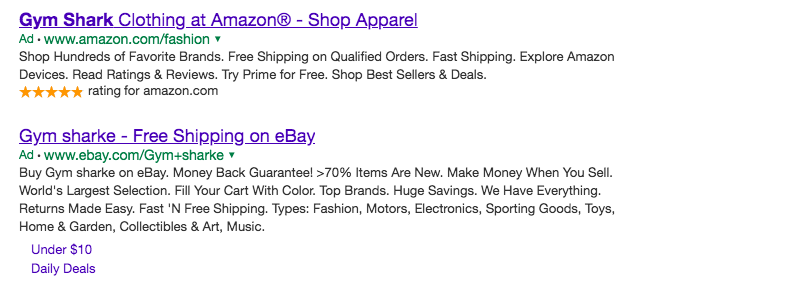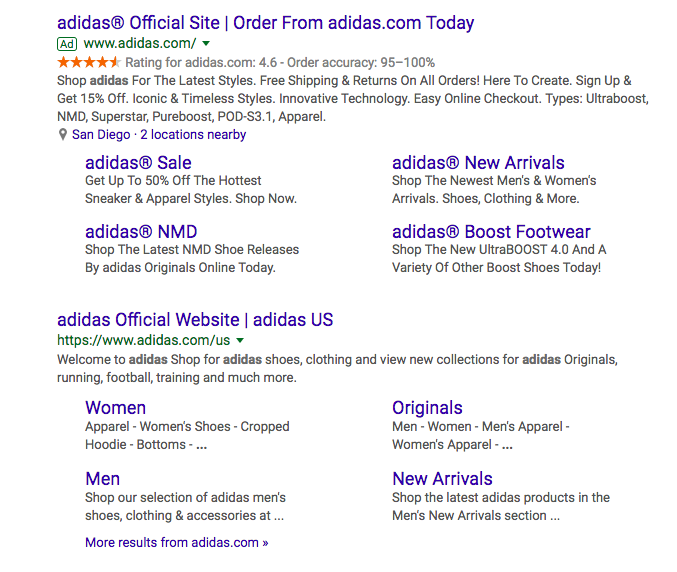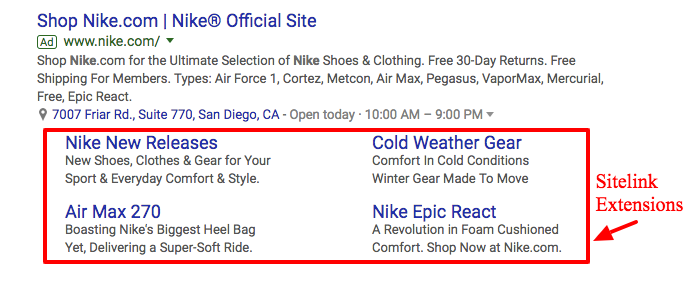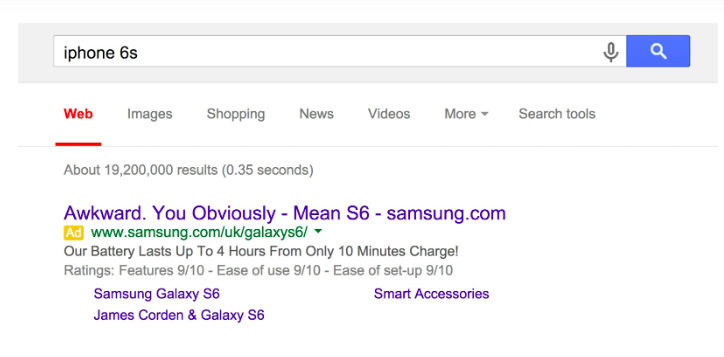Losing ad rank is never easy – and losing rank on your own brand name is even worse.
Unfortunately, other brands bidding on your name is an all too common occurrence.
In this article, I’ll go over the steps you should take to stop competitors from bidding on your branded terms.
Watch the Video or Read the Full Article Below
What you’ll learn:
- Why brands bids on other branded terms, and why it’s a problem
- How to identify where they’re running ads
- What steps to take to stop them from bidding on your brand terms
- If bidding on other brand’s terms is ever a good idea
First, Why is it a Problem?
Nothing’s more frustrating to a marketer than losing a ranking position to another business.
Oh, except one thing: losing your ranking position to a business using your brand name.
The obvious problem, besides it seeming a bit low and obnoxious, is that they’re stealing your glory.
The real problem? They’re stealing your clicks.
And to add insult to injury, they’re probably driving auction costs up higher as well, meaning the CPCs on your own brand name are costing more.
I know, say it with me: ugh.
One would think this kind of thing wouldn’t be allowed on Google’s tightly controlled network, but unfortunately, crying to Google won’t get you far on this one.
Their stance on the subject?
“Google won’t investigate or restrict the selection of trademarks as keywords, even if we receive a trademark complaint.”
While Google won’t allow advertisers to use brand names in ad copy, they’re okay with your brand name (your trademark) being used as a keyword to drive traffic to other people’s pages. It’s fair game.
A bit of a letdown, I know.
You may be wondering why other brands would bother trying to bid on brand names that clearly belong to someone else.
The answer is pretty simple. If a lesser-known or lesser-quality brand is using the name of a better-known brand, they can essentially capitalize on their success by riding their coattails.
Take a brand like Gymshark. It’s a well-known sportswear company, famous for its Instagram athletes and reasonably priced, quality clothing.
But check this out.
Here’s another company, using the Gymshark name, selling a similar product for cheaper. So not only is it using Gymshark’s name as a keyword to get more views, but it’s probably stealing a good bit of business due to its lower price point.

Example of competition bidding on another’s brand term
Not cool, right?
So what options, if any, does that leave the advertisers whose brand names are being preyed upon?
While there’s no hard and fast way to stop the competition from bidding on your brand name, there are a few steps you can take to
-
Check to See if it’s Worth Taking Action
While it may ruffle a few feathers, it may ultimately be the case that even if a competitor is bidding on your name, they aren’t really doing any damage.
That’s why it’s a good idea to survey the extent of their campaign before taking any measures to combat their questionable actions.
Start, of course, with the mac daddy of internet search: Google.
And by Google, I mean its search partners as well. For anyone unfamiliar, Google AdWords partners with hundreds of sites who are then able to run ads on their website. Think Google Display Network – these show up on so many different websites because they’re partners with Google.
While many of these are minor websites that probably won’t take much traffic from you, Google does partner with some pretty big names like Amazon and AOL.
Full disclosure: Google won’t tell you all of its partners, but a few can be found here.
From this list, go through and perform a search for your product on each network to determine where your competitors may be popping up for your brand.
Do the same thing across the Bing network.
And – this one’s important – make sure to take note of any websites where your competitors are actually ranking above you in the results.
Best case scenario: you may find that even though your competitors are bidding on your brand name, it’s not actually affecting your rank.
But if you find that your rank is indeed suffering substantially, move on to step two.
-
2. Stop Competitors Bidding on Branded Terms: Ask Them to Stop
Life tip here: kindness is always the best course of action.
Perhaps the worst thing you could do is wage a full-on Google war without any initial communication, so start smart and politely ask them to stop using your brand name as part of their keyword strategy.
I’m not saying it will work, and if they really are driving high ranks and CTRs with your name, they probably won’t be likely to stop simply because you said ‘please.’
But what you do want them to know is that you’re aware of what they’re doing it, and you’re not okay with it.
Start simple. As with usual email outreach rules, give a quick introduction, find something about their site or product to compliment (this is key to effective marketing communication!), and then tell them yes, you see they’re using your keyword and would they please mind refraining in the future?
If you don’t hear back, you can always follow up with another (polite!) email, only this time tell them that you do plan to inact some PPC-style revenge if they don’t want to handle it the easy way.
Again, if they don’t comply, no harm no foul.
You took the high road initially; now it’s time for things to get interesting.
-
Increase Your Bid on Your Brand Name
One of the reasons competitors may be bidding on your brand name is simply because you aren’t.
The fewer bids on a keyword, the less expensive it will be. And the less expensive your keyword is, the more likely competitors are to snatch it up.
So your first step is to make sure that you are in fact bidding on your own brand name.
Now, some brands don’t really like to do this. They feel that if they are already ranking organically for their brand name, they shouldn’t spend money bidding on it when they could allocate that budget to new terms.
But if you aren’t bidding on your own brand name, your competitors paid ads will be shown above your organic listing.
That’s absolutely not what you want, so if you find a competitor is, in fact, running ads on your brand name, you better be too.
Remember, you want to dominate the top of the SERPs for your brand, which means your ultimate goal should be to take top spots for paid and organic, like Adidas does here.

To stop competition bidding on your brand term, always bid on your own brand name
The good news is that it’s unlikely to be an expensive bid. Assuming there aren’t that many competitors bidding on your name, the cost-per-click (CPC) is generally pretty low.
The bad news is that if your competitors are still ranking high, you’ll want to increase your bid.
Not only will that increase the likelihood that your ad will rank higher, but it will make clicks more expensive for your competitors, and they’ll ultimately have to increase their bid if they want to outrank you.
-
Stop Competitors Bidding on Branded Terms: Inspect Their Ads for Violations
While using a trademark as a keyword isn’t against the rules, using it in ad copy is.
(Sidenote: if you haven’t trademarked your brand name, you might want to get on that now.)
Here’s what Google has to say on the subject:
“If a trademark owner submits a complaint to Google about the use of their trademark in Google Ads ads, we will review it and may enforce certain restrictions on use of the trademark. The following policies apply to trademarks used in text ads on the Search Network, and they are enforced when a trademark owner submits a valid trademark complaint to Google.”
So make sure that as you research different websites and networks that you’re taking the time to read through any ads you find.
If you do find any violations, you can report them to Google.
Again, this doesn’t apply to keywords alone, but if you can catch them using your trademark in acutal copy, you have a good case for Google.
-
Stop Competitors Bidding on Branded Terms: Increase your AdRank
Your AdRank determines how high your ad will be placed in the SERPs.
Naturally, you want that to be as high as possible.
Google calculates AdRank primarily using your bid amount, expected click-through rate, and landing page experience.
We already talked about increasing your bid, so lets focus on the other two.
First, up expected click-through rate (CTR). Keep in mind, this is the expected CTR, which Google calculates with an algorithm.
But you still want to do everything in your power to make sure you’re getting the highest CTR possible.
A lot of that will come down to your ad copy. When it comes to PPC copy, you have just a little space to get in a lot of information, so you want to make sure you have something compelling enough to catch readers attention and a killer CTA to entice them to click.
For more tips on PPC copywriting, check out my full article here.
Next up, you want to focus on a compelling landing page. The higher the bounce rate on your landing page, the lower your AdRank and Quality Score will be.
The first way to improve your landing page is to makes sure that it’s relevant and related to the search term and ad that accompanies it.
So if you’re advertising discount hoodies and send users to a page full of t-shirts and two hoodies at the bottom, it’s safe to say they won’t be too happy.
Next, focus on creating a great user experience. Make sure it’s easy to navigate, professionally designed, loads quickly, and responds across all devices.
-
Use Ad Extensions to Take Up More SERP Real Estate
Another great way to increase your CTR – and the amount of space you take up at the top – is through ad extensions.
Keep in mind that the higher your Quality Score, the more likely it is your ad extensions will show, so you want to work on these two together.
Ad extensions are additional pieces of information you can add to your ad, including everything from contact information and call buttons to customer reviews and additional links to your site.

Adding ad extensions can help deter the competition from bidding on your brand term
They have the added benefit of adding more content to your add, which often means they take up a good bit of space. In turn, that means more people will be drawn to your ad – and spend less time scrolling down to any competing ads.
They’re also known to improve ad clicks, which will have a positive effect on your ad placement.
Ad extensions come in two forms: manual and automatic.
Manual, as you may guess, are set up by you. Automatic extensions are generated by Google based on what it thinks will improve your ad performance.
There are plenty of extensions, and I’ve written a full guide on them here.
Is Bidding on Competitors Brand Name Ever a Good Thing?
Again, it’s a grey area.
Clearly, there’s clicks and traffic to be gained from a strategic campaign that uses a competitor’s brand name as a keyword.
Some will tell you that the best way to approach a competitor is to fight fire with fire (ie bid on their branded terms.)
And to tell the truth, it’s not always a terrible idea.
Some brands have even seen great success with this strategy. Take Samsung’s campaign using Apple’s iphone 6S.

Bidding on competitor’s brand terms can be done well
They playfully turned the situation around to advertise effectively for their S6 model, and likely poached some customers in the process.
The thing is, they did it well.
It was creative and fun, and fit into an overall ad strategy that involved plenty of iphone-bashing.
And really, would anyone have been surprised to see retaliation from Apple?
Probably not, which is why so many brands do in fact target competitors keywords who have bid on theirs.
Remember, at the end of the day AdWords is a competition, so don’t feel bad about using a tactic like this. Just do so the right way.
You may find that your bids drive CPCs up enough for the competition that they’re willing to compromise: they’ll stop bidding on your terms if you stop bidding on theirs.
Wrapping Up How to Stop Competitors Bidding on Your Brand Terms
It’s never a good feeling to be outranked – especially on your own brand term.
If this does happen to you, remember, there are ways to combat it even without Google’s help.
First, see what the damage is and reach out directly to the competitor. Then, work on improving your own bid and AdRank to beat them. As a last result, you can always consider bidding right back on their brand terms.